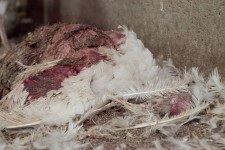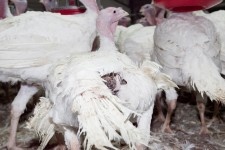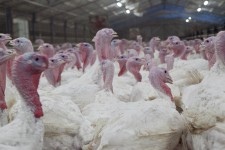- Overview
- Confinement
- Turkey poults
- Mutilation
- Artificial lighting
- Health Concerns
- Use of antibiotics
- Genetic alterations
- Muscle disorders
- Skeletal disorders
- Lame and injured birds
- Mortality rate
- Artificial insemination
- Health problems of breeders
- Slaughterhouse
- Turkeys: sentient and intelligent
- Conclusion
- References
Use of Antibiotics
Factory-farmed turkeys live in unnatural crowded conditions in which disease and infections are common.(29) Antibiotics are used to treat bacterial infections. It has been reported that even 'healthy' turkeys are routinely given antibiotics in their feed throughout the 'production cycle' in order to reduce potential outbreaks of disease.(30)
Poultry producers discovered in the 1940s that feeding antibiotics to birds assisted growth, so antibiotics are used to accelerate this growth.(31) Whilst meat-producing industries claim that antibiotic residues in meat do not harm humans, research has indicated that antibiotics given to farmed animals can encourage antibiotic-resistant bacteria and that these bacteria can be passed onto humans via the food chain.(32)
Research indicates that the more antibiotics are used the more antibiotic resistant bacteria and viruses (in humans) will become, leading to more complications, more blood infections and higher mortality.(33) This is of concern not only for the birds themselves but for the humans and pets who consume them. Sweden and Denmark have set a precedent by banning the use of antibiotics in commercial farming.




